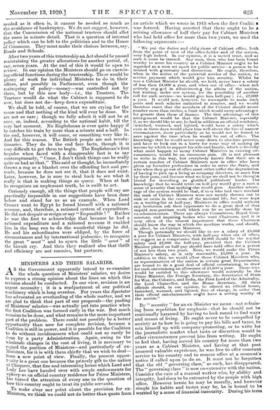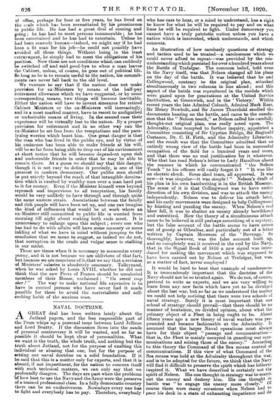MINISTERS AND THEIR SALARIES.
AS the Government apparently intend to re-examine the whole question of Ministers' salaries, we desire to express a strong opinion about the lines on which this revision should be conducted. In our view, revision is an urgent necessity ; it is a readjustment of our political machinery which is long overdue. For years the Spectator has advocated an overhauling of the whole matter, and we are glad to think that part of our proposals—the pooling of Ministers' salaries—was actually put into practice when the first Coalition was formed early in the war. But much remains to be done, and what remains is the more important part of the problem. There could not possibly be a better Opportunity than now for complete revision, because a Coalition is still in power, and it is possible for the Coalition to do without invidiousness what could not so easily be done by a party Administration. Again, owing to the wholesale changes in the cost of living, it is necessary to regard the position of Ministers—and particularly of ex- Ministers, for it is with them chiefly that we wish to deal— from a new point of view. Finally, the present oppor- t.mity is a great one because the princely gift to the nation ti Chequers, that fine and interesting house which Lord and Lady Lee have handed over with ample endowments for upkeep as an official country residence for Prime Ministers, has turned the attention of every one to the question of how this country ought to treat its public servants.
To make clear our point about the provision for ex- Ministers, we think we could not do better than quote from an article which we wrote in 1915 when the first Coalitids was formed. Having asserted that there ought to be retiring allowance of half their pay for Cabinet Ministers who had held office for more than two years, we used the following arguments :—
" We put the duties and oblig glens of Cabinet office, both from the point of view of the uttice.holder and of the nation. very Irgh indeed. In our opinion, it is a sacred trust, and as such it lomat be treated. Any man, then, who has been found worthy to serve his country as a Cabinet Minister ought to be regarded as a man set apart for public service—a person to be treated with gmerosity and distinction. He ought, therefore, when in the active or the potential service of the nation, to receive payment which would give him security. Whilst he was a Cabinet Minister he should, we hold, never have a salary of less than £4,000 a year, and when out of office—when not actively ergiigial in administere g the affairs of the nation, but waiting, under our system, for the possibility of another call for such service—we would give him half-pay; i.e., 12,000 a year. It would not, however, be reasonable to make such posts and such salaries unlimited in number, and we would therefore enact that the members of time Cabinet should never number more than twelve, a limit which would carry advantages far greater than those of finance. The first advantage of this arrangement would be that the Cabinet Minister, especially if, as we should like to sec, he had in addition an official residence, furnished, warmed, and lighted, would have a salary which even in these days would place him well above the line of narrow circumstances, more particularly as he would not be forced to save against the time when he would be out of office. The knowledge that he would never come down to absolute poverty, and have to look out in a hurry for some way of making an income by which to support his wife and family, which is literally what must happen to many Cabinet Ministers in existing cit.- ciumudances, would be an enormous gain. (It is not pleasant to write in this way, but everybody knows that there are a certain number of Cabinet Ministers now in office who have given up lucrative professions in order to servo the State, and who when they go out of office must either suffer the degradation of having to pick up a living as company directors, or mutt live by their pens, end become what we hope we shall not bo thought brutal for describirg as glorified publishers' hacks. The knowledge that he would retire on halIpay would give a man a sense of security that nothing else would give. Another advan- tage of the system would be that, if mina who had once reached the rank of Cabinet Ministers wore not merely thrown out to sink or swim in the ocean of the national life, hut were kept on a waiting-list at half pay, Ministers in office could without any hesitation ask their opponents to do a great deal of that unpaid non-partisan work which can be so usefully done by ex-administrators. There are always Conunittees, Royal Com- missions, and inquiring bodies who want Chairmen, and it is very often of the utmost importance that these Chairmen should know the way in which the machine works, and should, in effect, be ex-Cabinet Ministers.
Though personally we should like to see a salary of £5,000 a year for Cabinet Ministers, with half-pay when out of office, we suggest as a compromise that £4,000 should ha the n Oar salary and £2,000 the half-pay, provided that tho Cabinet Minister placed on half.pay should have hold office for a period of not less than two years. Next, we would make the Prune Minister's salary, as is only reasonable, £5,000 a year. In addition to this, we would allow those Cabinet Ministers who, as representatives of the nation in certain great Departments, are bound to do a good deal of official entertaining, to draw for such entertaining an allowance of £1,000 a year. Those woo would be entitled to this allowance would naturally be the Primo Minister, the Foreign Secretary, the Secretaries of State for War, the Colonies, and India, the First Lord of the Admiralty, the Lord Chancellor, and the Homo Secretary. All these officials should, in our opinion, be offered an official house, furnished, warmed, and lighted, free of charge, In order that their official entertainments might have a setting worthy of the nation."
By" security "for an ex-Minister we mean—not refrain- ing from repetition for emphasis—that he should not be continually harassed by having to look round to find ways and means of living. He ought never to be compelled by anxiety as to how he is going to pay his bills and taxes, to mix himself up with company-promoting, or to write for the journalistic market what taste or discretion would in other circumstances prevent him from writing. He ought to feel that, having served his country for more than two years as a Cabinet Minister, and having at that post amassed valuable experience, he was free to offer constant service to his country and to resume office at a moment's notice if called upon to do so. It must not be forgotten that the old " governing class," as such, has disappeared. The" governing class " is now co-extensive with the nation. Consider the case of a manual worker who, by ability and integrity, had risen to be entrusted by the people with high office. However heroic he may be morally, and however simple his habits and tastes may be, he is bound to be worried by a sense of financial insecurity. During his term of office, perhaps for four or five years, he has lived on the scale which has been necessitated by his prominence in public life. He has had a great deal of coming and going ; he has had to meet persons innumerable ; he has been entertained and he has had to entertain. Unless he had been scarcely human—indeed, we might say if he had been a fit man for his job—he could not possibly have avoided all these things. Without being in the least extravagant, he simply had to meet the obligations of his position. Now these are not conditions which can suddenly be switched off and said good-bye to when a man leaves the Cabinet, unless, of coarse, he goes out of political life. So long as he is to remain useful to the nation, his commit- ments can never fall back to the old leveL We venture to say that if the nation does not make provision for ex-Ministers by means of the half-pay retirement allowance which we have suggested, or by some corresponding means, two things will become inevitable. Either the nation will have to invent sinecures for retired Cabinet Ministers or the ox-Ministers will increasingly, and in a most marked manner, have to resort to undignified or undesirable means of living In the second case their experience will be virtually lost to the nation. By a proper provision for retirement and in no other way can the ex-Minister be set free from the temptations and the pars,- lying worries which beset him. One great danger is that the man who has lived in the public eye, and by virtue of his eminence has been able to make friends at his will, will be so far from being able to drop out of his environment at short notice that he will become dependent upon rich and undesirable friends in order that he may be able to remain there. At a guess we should say that this danger, though it is not easy to define it precisely, is one of the greatest in modern democracy. Our public men should be put utterly beyond the reach of that intangible domina- tion which is exerted by wealthy men over a man hard put to it for money. Even if the Minister himself were beyond reproach and impervious to all temptation, his family would be very unlikely to have through and through quite the same austere strain. Associations between the family and rich people will have been set up, and one can imagine the kind of influences that would be at work where an ex-Minister still committed to public life is worried from morning till night about making both ends meet. It is unnecessary to enlarge upon this subject ; every one who has had to do with affairs will have some memory or some inkling of what we have in mind without jumping to the conclusion that we mean to suggest, as indeed we do not, that corruption in the crude and vulgar sense is stalking in our midst.
These are times when it is necessary to economize every penny, and it is not because we are oblivious of that fact, but because we are conscious of it,that we say that a revision of Ministers' salaries is absolutely necessary. Talleyrand, when he was asked by Louis XVIII. whether he did not think that the new Peers of France should be unsalaried members of their House, exclaimed : "Ca &wait trop cher I" The way to make national life expensive is to have in control persons who have never had it made possible for them to avoid the materialistic and self- seeking habit of the anxious man.







































 Previous page
Previous page